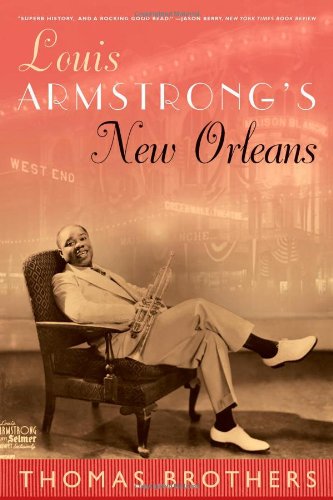Review: Louis Armstrong’s New Orleans by Thomas Brothers
Reviewed by Paul M. Davis

Early in Thomas Brothers’ Louis Armstrong’s New Orleans, Brothers takes direct aim at the accepted historical reading of Louis Armstrong and his musical legacy—nearly a century since Armstrong first made a name for himself as a hot young trumpet player, the musician has reached a sanctified state in American history, and become a figure, like countless titans of American culture beside him, without a context, a background, or a historical mooring. In the process, Armstrong and his moment in history has been robbed of its truth, and the brutal reality of the racial relations he navigated every day. Brothers argues, and makes a compelling case, that Armstrong has been transformed into an unreal figure whose singular talent has been codified in a manner consistent with the recurrent racist trope of the noble savage.
Brothers’ language is crisp and clean, and he handily avoids any sort of easy mythologizing or sentimentality in his effort to strip the Armstrong mythos of the empty platitudes of high-school-level historical narrative. Armstrong came of age and made music in a brutal period for race relations, in a New Orleans that might have taken some sense of pride in its relatively open views of race relations for the time, an illusion that disguised much more brutal fissures of racial strife.
It’s a reality of both Armstrong’s life and the New Orleans he came of age in, and Brothers is far more interested in re-examining the political and cultural climate that made Armstrong who he was, returning Armstrong and the city back into its distinct historical context, than in re-writing the accepted biographical details of Armstrong’s life. Avoiding the strict linear conventions of the biography, Brothers instead encircles his subject, unraveling a seminal event in Armstrong’s young life out to its logical extent, unwinding the effect the musical, cultural and political influences of the time had on Armstrong, and then coiling back in to examine another layer of Armstrong’s life and the cultural moment in which he existed.
Meticulously researched, Brothers’ examination at times veers too far towards the academic, but even in those moments, the vibrancy of Armstrong’s New Orleans guarantees that the account remains engaging. Louis Armstrong’s New Orleans is essential reading not only for acolytes of Armstrong and his work, but also for anyone who desires to look past the mythos of larger-than-life American figures and find the real individuals and cultural moments that lay beneath the canonical narrative.
Paul M. Davis writes articles, essays and fiction, plays music, and lives in Chicago, IL. He also edits Is Greater Than, an online magazine of culture and literature.
